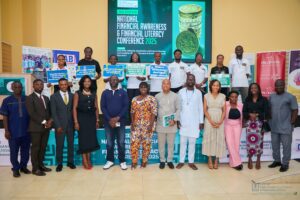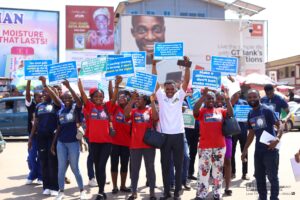The Center for Financial Literacy Education Africa (CFLE-Africa) today concluded its month-long campaign in observance of Financial Literacy Month, marking a remarkable period of engagement, education, and nationwide mobilisation under the theme: “Building Wealth, Changing Lives: Strengthening Communities through Personal and Business Financial Education.”
Throughout the month of April, CFLE-Africa led an expansive campaign designed to reach diverse audiences from market women and students to small business owners and corporate professionals through inclusive, practical, and action-oriented financial education.
According to Mr. John Awuah, Advisory Board Chairman of the Center for Financial Literacy Education Africa and CEO of the Ghana Association of Banks, “Financial literacy is foundational to economic transformation.
This campaign demonstrated the urgent demand for financial knowledge and the opportunity to instill habits that drive sustainable personal and business growth. We are proud to support such a high-impact initiative.”

Peter Asare Nyarko, Executive Director of Center for Financial Literacy Education Africa, reinforced this message, stating: “We are inspired by the energy, enthusiasm, and thirst for knowledge witnessed across the country. When people are given the right tools, supported by the right partners, they take charge of their financial future, and that is the true meaning of empowerment.”
Campaign highlights and reach
This year’s campaign focused on delivering tailored, practical financial literacy programs across a wide range of platforms and regions, including:
- National Financial Awareness & Financial Literacy Conference 2025

Hosted in partnership with the Ghana Association of Banks, this national event convened stakeholders including students, educators, financial institutions, policymakers, and development partners. Participants explored strategies to scale financial literacy and inclusion, especially for underserved populations.
- Community Market Outreach Programs
In partnership with Prudential Life Insurance Ghana, CFLE-Africa conducted face-to-face financial literacy outreach in major markets across the country. Market traders and entrepreneurs in Madina, Kumasi Kejetia, Sunyani, Tudu, Ashaiman, Koforidua, and Takoradi received practical guidance on budgeting, savings, insurance, and investing.
- Regional Financial Literacy Konnect Meetups
In collaboration with the GhanaThink Foundation, the organization hosted peer-led financial education sessions in Navrongo, Wa, Tamale, Bolgatanga, Techiman, Sunyani, Kumasi, Obuasi, Accra, Tema, Koforidua, and several other towns. These meetups connected individuals with mentors and local role models who shared real-life financial lessons and strategies.
Key observations
- Widespread Demand for Practical Financial Knowledge: Citizens, particularly youth and informal workers, expressed a desire for context-specific content that applies to their everyday lives. This reinforces the need for localized, relevant, and participatory learning formats.
- Digital Tools are Expanding Access: The increased use of mobile applications, WhatsApp platforms, and social media boosted engagement levels among young people and remote learners. Moving forward, digital literacy must be a central component of financial education.
- Women and Youth Leading the Charge: There is growing interest in financial independence among women and young people, with many eager to lead financial education efforts in their communities. Tailored content for these demographics could yield generational transformation.
- SMEs Require More Than Funding: Many small businesses fail not due to lack of capital, but because of weak financial planning, pricing models, and poor resource management. Ongoing coaching and mentoring must be integrated into business support programs.
Lessons learned
- Financial Literacy Must Be Continuous: One-time sessions are insufficient. Lasting impact comes from consistent mentorship, long-term programs, and accountability systems.
- Behavioral Change Takes Time: Teaching financial skills is important, but building confidence and discipline is equally critical to fostering good financial habits.
- Communities are Critical Multipliers: Involving schools, churches, families, workplaces, and civic groups enhances outreach and ensures deeper, more sustained impact.
Looking ahead
With Financial Literacy Month officially ending, CFLE-Africa emphasizes that the journey toward financial empowerment is far from over.
For Individuals, the next step is to commit to lifelong learning, establish clear financial goals, and take advantage of available tools, training, and community support systems.
For Businesses, it’s time to prioritise financial capability-building among staff, strengthen internal processes, and adopt training programs that foster transparency and sustainability.
CFLE-Africa extends its sincere gratitude to its strategic partners, whose collaboration made this campaign possible, including Ghana Association of Banks; The Financial Awareness Foundation (USA) ; Prudential Life Insurance Ghana ; KPMG Ghana ; Deloitte Ghana ; GhanaThink Foundation; Media partners such as Sikaman Times, Joy News, and other national and local media ; Educational institutions, student groups, and countless community volunteers.
CFLE Africa remains committed to delivering innovative, scalable, and impactful programmes.










